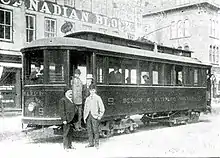Kitchener and Waterloo Street Railway
The Kitchener and Waterloo Street Railway was a street railway in Berlin (renamed Kitchener in 1916) and Waterloo in Ontario, Canada. Horsecar service began in 1888 under the original Berlin and Waterloo Street Railway name and continued until the system was electrified in 1895, when the existing horsecars were converted for electric service. This proved ineffective, and the company suffered from under-investment. In 1896, a local consortium bought out the company and purchased a new fleet of purpose-built electric trams. The system was municipalized in 1907 and was run by the Town (later City) of Berlin/Kitchener until the end of service. The railway was renamed in 1919 to reflect the name change of the City of Kitchener, which had occurred in 1916. In 1927, it was reorganized under the Kitchener Public Utilities Commission, which continued operations until 1946, when tram service was discontinued and replaced with trolleybus service.[1][2]
| Kitchener and Waterloo Street Railway | |||||||||||||
|---|---|---|---|---|---|---|---|---|---|---|---|---|---|
 Streetcar photographed on King Street at King and Ontario in front of the Canadian Block building. | |||||||||||||
| Operation | |||||||||||||
| Locale | Kitchener and Waterloo, Ontario, Canada | ||||||||||||
| Open | 1888 | ||||||||||||
| Close | 1946 (replaced by trolleybus service) | ||||||||||||
| Status | Closed | ||||||||||||
| Lines | 1 | ||||||||||||
| |||||||||||||
| |||||||||||||
| |||||||||||||
Early operations
The street railway originated with the chartering of the Berlin and Waterloo Street Railway Company in 1886. By 1888, however, there had still been considerable delays in the construction of the line, and the local holders of the charter made the decision to sell the company to an American consortium, which sent Thomas M. Burt of Boston to Berlin to supervise construction.[3] The Town of Waterloo had passed an amended bylaw setting the date for the start of construction at 1 July 1888, so on 30 June, the ceremonial first spikes were driven by the mayors of Berlin and Waterloo. At the time, the deferred completion date was 1 August 1889, but the line was largely complete by 13 June, when the first streetcar crossed the Grand Trunk Railway tracks in Berlin and went as far to the south as Scott Street. The driver of the horsecars was Henry U. Clemens, who estimated that they transported about 400 people per day, carrying 10-15 passengers per car from a first southbound trip at 6:40 am to a final northbound trip arriving at Waterloo at 10:20 pm.[3]
Legacy
Though the tracks were largely removed in the 1950s, some physical remnants of the streetcar line survived until the 2010s, when wooden ties were discovered during excavations on King Street to prepare for the construction of the ION light rail system.[4]
See also
References
- "Kitchener & Waterloo Street Railway". TrainWeb. 4 February 2007. Retrieved 19 February 2020.
- "A History of Kitchener Transit". 1 October 2001. Retrieved 19 February 2020.
- Ball-Pyatt, Karen (5 August 2015). "All aboard the Berlin & Waterloo Street Railway! (Part I 1889-1894)". Historically Speaking. Kitchener Public Library.
- Swayze, Kevin (27 March 2015). "Century-old streetcar line found under LRT construction". Waterloo Region Record. Retrieved 19 February 2020.
Further reading
- Ball-Pyatt, Karen (5 August 2015). "All aboard the Berlin & Waterloo Street Railway! (Part I 1889-1894)". Historically Speaking. Kitchener Public Library.
- Mills, John M. (1977). "Chapter VI: Berlin & Waterloo Street Railway, Kitchener–Waterloo Railways". Traction on The Grand: The Story of Electric Railways along Ontario's Grand River Valley. Railfare Enterprises. ISBN 0-919130-27-5.
External links
| Wikimedia Commons has media related to Kitchener and Waterloo Street Railway. |